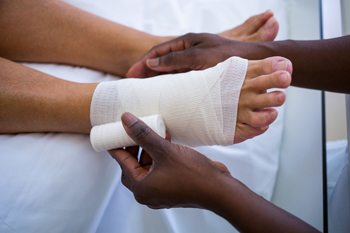Douglas Pacaccio, DPM
Thomas Nordquist, DPM
January 2020
Identifying Your Wound
 People can develop a wound for a number of reasons. When a wound has occurred, it’s important that you be able to identify it, that way you know how best to treat it. Wounds may either be open or closed. Open wounds break the skin and may leave the internal tissue exposed. Closed wounds, however, do not break the skin. These types of wounds may involve tissue damage or bleeding that occurs underneath the skin’s surface. Whether a wound is opened or closed, immediate care should be sought in order to help prevent getting an infection. Those with diabetes should take particular care of their feet in order to avoid getting a wound, as they are more likely to develop an infection, which may lead to further foot complications. For more advice on how to identify and treat wounds of the feet, we recommend you consult with a podiatrist for professional care and treatment.
People can develop a wound for a number of reasons. When a wound has occurred, it’s important that you be able to identify it, that way you know how best to treat it. Wounds may either be open or closed. Open wounds break the skin and may leave the internal tissue exposed. Closed wounds, however, do not break the skin. These types of wounds may involve tissue damage or bleeding that occurs underneath the skin’s surface. Whether a wound is opened or closed, immediate care should be sought in order to help prevent getting an infection. Those with diabetes should take particular care of their feet in order to avoid getting a wound, as they are more likely to develop an infection, which may lead to further foot complications. For more advice on how to identify and treat wounds of the feet, we recommend you consult with a podiatrist for professional care and treatment.
Wound care is an important part in dealing with diabetes. If you have diabetes and a foot wound or would like more information about wound care for diabetics, consult with one of our podiatrists from Advanced Foot and Ankle Surgeons, Inc. . Our doctors will assess your condition and provide you with quality foot and ankle treatment.
What Is Wound Care?
Wound care is the practice of taking proper care of a wound. This can range from the smallest to the largest of wounds. While everyone can benefit from proper wound care, it is much more important for diabetics. Diabetics often suffer from poor blood circulation which causes wounds to heal much slower than they would in a non-diabetic.
What Is the Importance of Wound Care?
While it may not seem apparent with small ulcers on the foot, for diabetics, any size ulcer can become infected. Diabetics often also suffer from neuropathy, or nerve loss. This means they might not even feel when they have an ulcer on their foot. If the wound becomes severely infected, amputation may be necessary. Therefore, it is of the upmost importance to properly care for any and all foot wounds.
How to Care for Wounds
The best way to care for foot wounds is to prevent them. For diabetics, this means daily inspections of the feet for any signs of abnormalities or ulcers. It is also recommended to see a podiatrist several times a year for a foot inspection. If you do have an ulcer, run the wound under water to clear dirt from the wound; then apply antibiotic ointment to the wound and cover with a bandage. Bandages should be changed daily and keeping pressure off the wound is smart. It is advised to see a podiatrist, who can keep an eye on it.
If you have any questions, please feel free to contact one of our offices located in Sycamore, and Yorkville, IL . We offer the newest diagnostic and treatment technologies for all your foot care needs.
Pain in the Back of the Leg
 Patients who have experienced an Achilles tendon injury are often familiar with the pain and discomfort this condition can cause. It can often be debilitating, and may considerably restrict the ability to walk and run. This tendon is located in the calf, and it connects the calf muscles to the ankle. This type of injury can happen as a result of being overweight, exercising on uneven surfaces, or wearing shoes that do not fit correctly. Some of the symptoms that are associated with a partial or complete tear of the Achilles tendon can include swelling, severe pain in the back of the leg, and it may be difficult to move the ankle. If you think you may have an Achilles tendon injury, please schedule an appointment with a podiatrist as quickly as possible so the correct treatment can begin.
Patients who have experienced an Achilles tendon injury are often familiar with the pain and discomfort this condition can cause. It can often be debilitating, and may considerably restrict the ability to walk and run. This tendon is located in the calf, and it connects the calf muscles to the ankle. This type of injury can happen as a result of being overweight, exercising on uneven surfaces, or wearing shoes that do not fit correctly. Some of the symptoms that are associated with a partial or complete tear of the Achilles tendon can include swelling, severe pain in the back of the leg, and it may be difficult to move the ankle. If you think you may have an Achilles tendon injury, please schedule an appointment with a podiatrist as quickly as possible so the correct treatment can begin.
Achilles tendon injuries need immediate attention to avoid future complications. If you have any concerns, contact one of our podiatrists of Advanced Foot and Ankle Surgeons, Inc. . Our doctors can provide the care you need to keep you pain-free and on your feet.
What Is the Achilles Tendon?
The Achilles tendon is a tendon that connects the lower leg muscles and calf to the heel of the foot. It is the strongest tendon in the human body and is essential for making movement possible. Because this tendon is such an integral part of the body, any injuries to it can create immense difficulties and should immediately be presented to a doctor.
What Are the Symptoms of an Achilles Tendon Injury?
There are various types of injuries that can affect the Achilles tendon. The two most common injuries are Achilles tendinitis and ruptures of the tendon.
Achilles Tendinitis Symptoms
- Inflammation
- Dull to severe pain
- Increased blood flow to the tendon
- Thickening of the tendon
Rupture Symptoms
- Extreme pain and swelling in the foot
- Total immobility
Treatment and Prevention
Achilles tendon injuries are diagnosed by a thorough physical evaluation, which can include an MRI. Treatment involves rest, physical therapy, and in some cases, surgery. However, various preventative measures can be taken to avoid these injuries, such as:
- Thorough stretching of the tendon before and after exercise
- Strengthening exercises like calf raises, squats, leg curls, leg extensions, leg raises, lunges, and leg presses
If you have any questions please feel free to contact one of our offices located in Sycamore, and Yorkville, IL . We offer the newest diagnostic tools and technology to treat your foot and ankle needs.
It's Time for Beautiful Feet
Maintaining the Health of Your Child’s Feet
 The feet are the foundation of the body, so it’s important to make sure your child’s feet are healthy and well cared for to prepare them for supporting the body as they age. One way of helping your child’s feet gain strength is to allow for proper movement. As they begin to kick and crawl, they are working the muscles in their feet, so supporting this motion will only help them to become stronger. To allow for proper movement, it is also recommended to avoid dressing your child in tightly fitted booties, that way their feet and toes may develop naturally and move freely. Since babies grow quickly, it’s important that you update their footwear to avoid tightly fitted shoes or socks that may cause poor circulation. Washing and thoroughly drying their feet will also help to maintain proper hygiene. For more tips on how to keep your child’s feet healthy, we recommend you consult with a podiatrist for professional care and advice.
The feet are the foundation of the body, so it’s important to make sure your child’s feet are healthy and well cared for to prepare them for supporting the body as they age. One way of helping your child’s feet gain strength is to allow for proper movement. As they begin to kick and crawl, they are working the muscles in their feet, so supporting this motion will only help them to become stronger. To allow for proper movement, it is also recommended to avoid dressing your child in tightly fitted booties, that way their feet and toes may develop naturally and move freely. Since babies grow quickly, it’s important that you update their footwear to avoid tightly fitted shoes or socks that may cause poor circulation. Washing and thoroughly drying their feet will also help to maintain proper hygiene. For more tips on how to keep your child’s feet healthy, we recommend you consult with a podiatrist for professional care and advice.
The health of a child’s feet is vital to their overall well-being. If you have any questions regarding foot health, contact one of our podiatrists of Advanced Foot and Ankle Surgeons, Inc. . Our doctors can provide the care you need to keep you pain-free and on your feet.
Tips for Keeping Children's Feet Healthy
- Make sure their shoes fit properly
- Look for any signs of in-toeing or out-toeing
- Check to see if they have Clubfoot (condition that affects your child’s foot and ankle, twisting the heel and toes inward) which is one of the most common nonmajor birth defects.
- Lightly cover your baby’s feet (Tight covers may keep your baby from moving their feet freely, and could prevent normal development)
- Allow your toddler to go shoeless (Shoes can be restricting for a young child’s foot)
- Cut toenails straight across to avoid ingrown toenails
- Keep your child’s foot clean and dry
- Cover cuts and scrapes. Wash any scratches with soap and water and cover them with a bandage until they’ve healed.
If you have any questions, please feel free to contact one of our offices located in Sycamore, and Yorkville, IL . We offer the newest diagnostic and treatment technologies for all your foot care needs.
Tips on How to Choose the Right Shoe for You
 When it comes to purchasing shoes, you want to ensure that you are getting both comfort and quality out of your footwear. To make sure your shoes are the perfect fit for you, it is recommended that you measure your feet beforehand, that way you have an idea of what size shoe will best fit your feet. A great tip to make sure you’re getting the most accurate measurement is to measure your feet at the end of the day, when they are typically at their largest. By doing this, you’re avoiding purchasing shoes that may be too small and will no longer properly fit your feet as the day goes on. It may also be helpful to wear a pair of socks you would normally wear with the shoes you’re looking into buying, that way you can tell if the shoes fit with your sock choice, or if they are too small. By picking the correct shoe size you may be preventing the development of foot complications such as hammertoes, blisters, and bunions. For more tips on how to choose the best shoe for you, we recommend you speak with a podiatrist for professional advice.
When it comes to purchasing shoes, you want to ensure that you are getting both comfort and quality out of your footwear. To make sure your shoes are the perfect fit for you, it is recommended that you measure your feet beforehand, that way you have an idea of what size shoe will best fit your feet. A great tip to make sure you’re getting the most accurate measurement is to measure your feet at the end of the day, when they are typically at their largest. By doing this, you’re avoiding purchasing shoes that may be too small and will no longer properly fit your feet as the day goes on. It may also be helpful to wear a pair of socks you would normally wear with the shoes you’re looking into buying, that way you can tell if the shoes fit with your sock choice, or if they are too small. By picking the correct shoe size you may be preventing the development of foot complications such as hammertoes, blisters, and bunions. For more tips on how to choose the best shoe for you, we recommend you speak with a podiatrist for professional advice.
Finding a properly-fitting shoe is important in reducing injuries and preventing foot problems. For more information about treatment, contact one of our podiatrists from Advanced Foot and Ankle Surgeons, Inc. . Our doctors will treat your foot and ankle needs.
Proper Shoe Fitting
A common concern when it comes to foot health, having properly fitted shoes can help prevent injuries to the foot. Out feet affect our posture and gait, which in turn affects the biomechanics and overall bodily structure. With 33 joints, 26 bones, and over 100 ligaments, the potential for serious injury is much greater than one realizes. Although the feet cease growth in adulthood, they still change shape as they mature. Here are some factors to consider when it comes to investing in proper fitting shoes:
- Be sure the shoes fit correctly right away
- Ensure the ball of your foot fits comfortably in the widest portion of the shoes
- Even though they may look fashionable, improper fitting shoes can either create adverse conditions or exacerbate existing ones you may already have
- Walk along a carpeted surface to ensure the shoes comfortably fit during normal activity
Keeping in mind how shoes fit the biomechanics of your body, properly-fitting shoes are vitally important. Fortunately, it is not difficult to acquire footwear that fits correctly. Be sure to wear shoes that support the overall structure of your body. Do your feet a favor and invest in several pairs of well-fitted shoes today.
If you have any questions please feel free to contact one of our offices located in Sycamore, and Yorkville, IL . We offer the newest diagnostic and treatment technologies for all your foot and ankle needs.
Blog Archives
- July 2024
- June 2024
- May 2024
- April 2024
- March 2024
- February 2024
- January 2024
- December 2023
- November 2023
- October 2023
- September 2023
- August 2023
- July 2023
- June 2023
- May 2023
- April 2023
- March 2023
- February 2023
- January 2023
- December 2022
- November 2022
- October 2022
- September 2022
- August 2022
- July 2022
- June 2022
- May 2022
- April 2022
- March 2022
- February 2022
- January 2022
- December 2021
- November 2021
- October 2021
- September 2021
- August 2021
- July 2021
- June 2021
- May 2021
- April 2021
- March 2021
- February 2021
- January 2021
- December 2020
- November 2020
- October 2020
- September 2020
- August 2020
- July 2020
- June 2020
- May 2020
- April 2020
- March 2020
- February 2020
- January 2020
- December 2019
- November 2019
- October 2019
- September 2019
- August 2019
- July 2019
- June 2019
- May 2019
- April 2019
- March 2019
- February 2019
- January 2019
- December 2018
- November 2018
- October 2018
- September 2018









